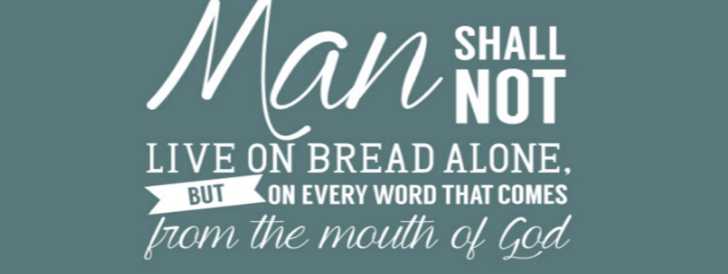
“One does not live on bread alone” (Mt. 4:4). This verse and the circumstance in which it is spoken gives us a powerful reflection during these 40 days before Easter. It comes during Jesus’ time in the desert, just before he begins his public ministry. As he is fasting in the dry heat of the desert, he is visited by Satan who, knowing who Jesus is, foolishly tries to tempt him, to turn him away from his mission.
Satan tempts Jesus with three things that we, as human beings, are very familiar with in our lives: instant gratification (sensuality), the temptation for fame, and the temptation to power. The verse we are reflecting on today is related to the first of these temptations. It is the temptation that gets at the most basic levels of our humanity, our stomachs, our nerve endings. Because our feelings are immediate and very powerful, we often give in to the temptations to satisfy them in the immediate moment. We can also be very adept at rationalizing these behaviors. The only way to combat these cravings, these sensual desires, the only way to put them into their proper balance in our lives, is to develop the virtue of self-discipline. But our self-discipline must have a goal, a purpose too. Jesus is our example here.
All of us have experienced physical hunger at some time in our lives. For most of us, though, that usually means that we have missed a meal. In our truly minor discomfort we are often guilty of complaining of being “starved” or “famished” when we are so imposed upon. Imagine Jesus, fasting for forty days, not eating or drinking, out in the heat of the desert. In his human flesh, he would have known real pain, real deprivation, but his fasting had a purpose beyond those physical needs. As God, Satan’s challenge to turn the very stones of the desert into bread to feed his hunger would have been easy to fulfill. After all, he had fed the Chosen People in the desert when they were lost and wandering for forty years. But in his humanity he gives a response to Satan’s challenge that rings with the tone and power of deep truth: “One does not live by bread alone, but by every word that comes forth from the mouth of God.”
Jesus’ response is what we are to reflect on. We are not animals, moved by our stomachs and nerve endings alone. We are human beings, made in the image and likeness of God. We are God’s children, endowed with immortal souls. There is more to this life than mere bread, and things. We are more than just flesh. While our bodies do, in fact, need food and water in order to survive and to thrive, our souls need something far more substantial than that. That which gives us the life that we are made for, that is, our eternal life with God, is “every word that comes forth from the mouth of God.” And here is the kicker: Jesus is the the Word, the Word that was with God, the Word that, indeed, is God. He is the Word through which all things came to be. (See the opening of John’s Gospel) Jesus is the Word that is life, both now and in eternity. He is the Bread of Life that our hearts and souls yearn for. Without him there is no life.
Lord, help us to recognize all temptations to gratify of our senses and feelings for what they really are. Deepen our faith in you. Give us the moral strength to no longer put finite things before you and to honor you alone as the Bread of Life. We ask these things in your name, Jesus. Amen!
SKM: below-content placeholderWhizzco for FHB

